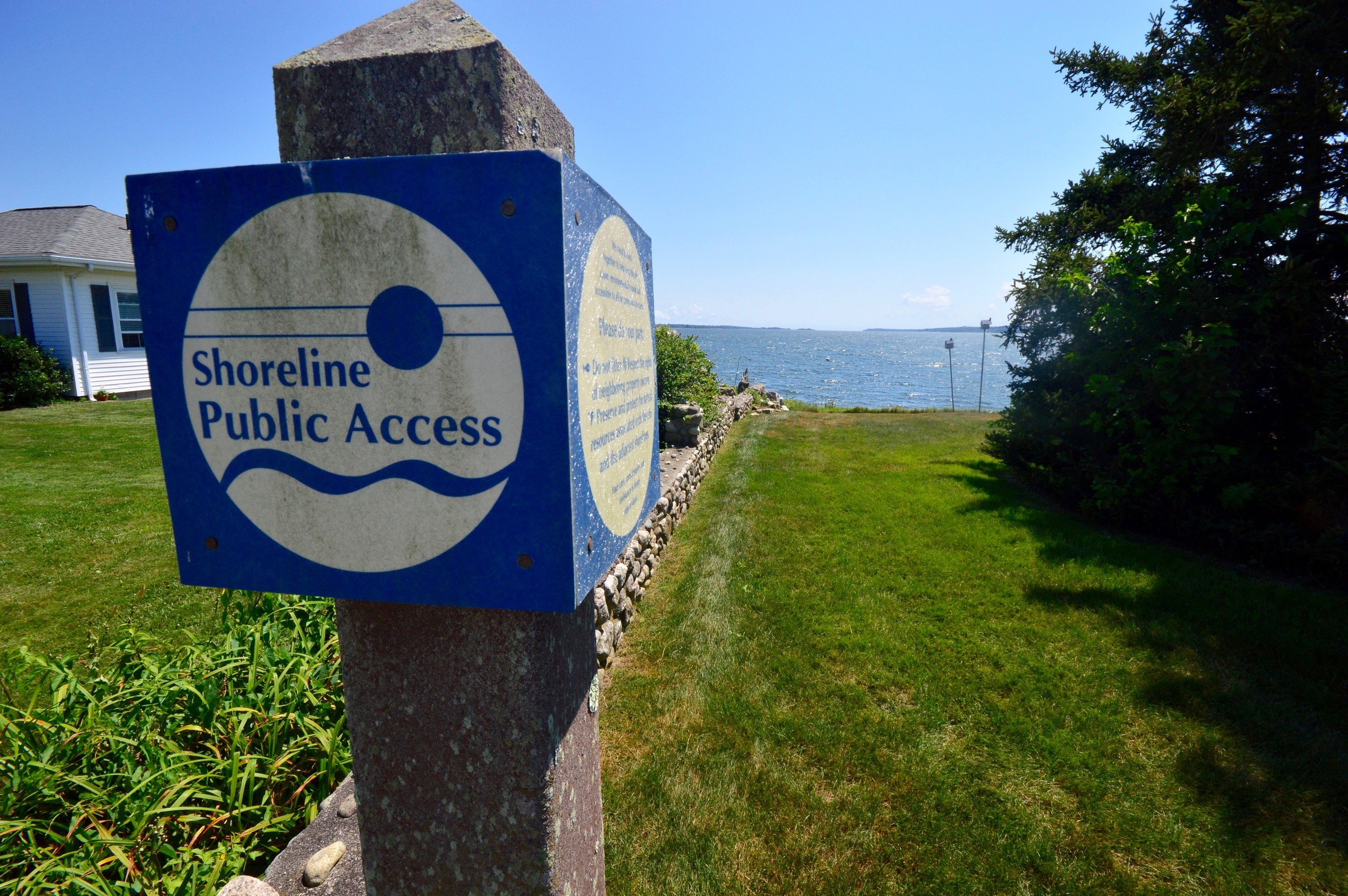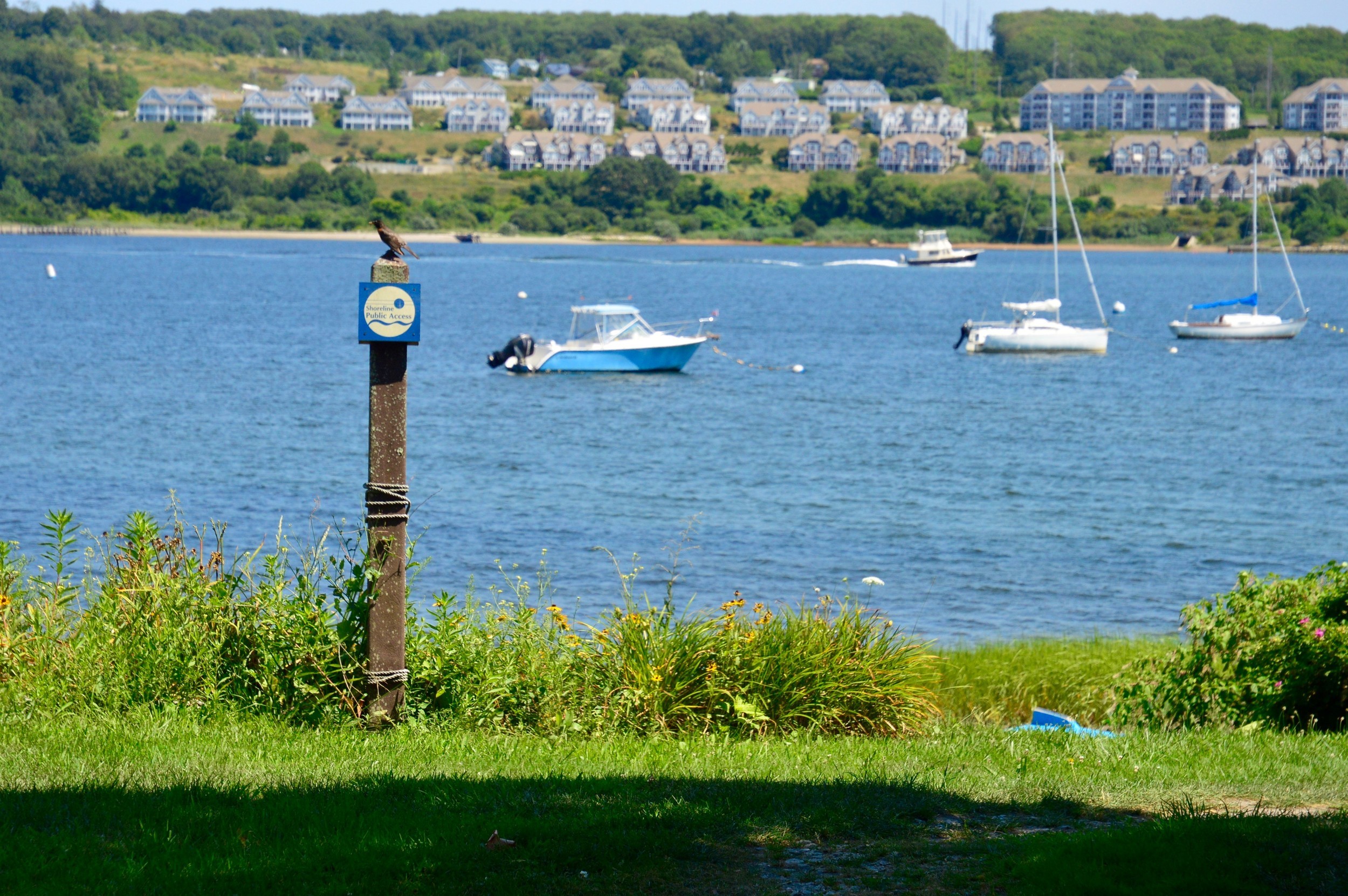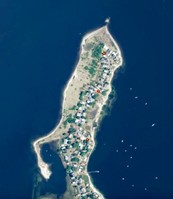Group wants to help protect Portsmouth’s paths to shoreline
Clean Ocean Access asks to ‘adopt’ local rights of way

Here are where Portsmouth’s 17 legal rights of way to the shoreline, as designated by the R.I. Coastal Resources Management Council, are located:
1) Mountview Road (tip of Common Fence Point)
2) Anthony Road (tip of Common Fence Point)
3) Narragansett Road (tip of Common Fence Point)
4) Cedar Avenue
5) Point Street
6) Green Street
7) Seaconnet Boulevard and Ivy Avenue
8) Seaconnet Boulevard
9) Seaconnet Boulevard and Gould Avenue
10) Seaconnet Boulevard and Island Park Avenue
11) Ruth Avenue
12) Fountain Avenue
13) Aquidneck Avenue
14) Atlantic Avenue and Tallman Street
15) Atlantic Avenue
16) Child Street
17) Morningside Lane
PORTSMOUTH — Pledging to help protect and improve the public’s access to the shoreline, the coastal environmental group Clean Ocean Access (COA) is seeking to adopt more than a dozen existing rights of ways in Portsmouth.
For now, the group is starting small by setting its sights on three of the 17 public shoreline access points in Portsmouth as designated by the R.I. Coastal Resources Management Council (CRMC). All three rights of way (ROWs) are located at the tip of Common Fence Point — off Mountview, Anthony and Narragansett roads.
Last week the town’s Harbor Commission voted 4-1 to recommend that the town enter a memorandum of understanding with COA and CRMC on those three access points. The memorandum would be an initial test of the relationship between COA and the town, commission members said.
There are a total of 225 ROWs designated by CRMC in Rhode Island, with 50 of them located on Aquidneck Island. (There are many others, but these are the only ones defined as legal ROWs by CRMC.) COA hopes to eventually adopt all 17 ROWs in Portsmouth, but that will ultimately be up to the Town Council.
Dave McLaughlin, executive director of COA, said the group has already adopted 23 public access points in Newport and 11 in Middletown under the CRMC’s Adopt-an-Access Program. While COA monitors all 50 CRMC-designated access points on the island at least once a month, the group hasn’t yet adopted any formally in Portsmouth, Mr. McLaughlin.
“We want to partner with Portsmouth,” he said, pointing out that the memorandum of understanding between COA, the town and CRMC is necessary to provide another legal framework that the rights of ways exist.
“It’s really just bringing an extra body to the table to work for the same common good,” said Mr. McLaughlin, adding that COA’s services, for which there is no charge, would include marine cleanup, water quality testing and more for each ROW.
He noted that a homeowner near the Cliff Walk in Newport recently tried to move a fence into a public ROW. COA took notice of the encroachment, contacted the city and helped resolve the issue, he said.
“We consider that our responsibility,” Mr. McLaughlin said, adding that COA has the staff to not only monitor local ROWs more frequently than the Harbor Commission does now, but to keep them clean as well.
Some of Portsmouth’s 17 ROWs have been threatened by fences appearing in new places or waterfront development taking away access, according to COA.
“It seems like a no-risk proposition for the town,” said Mike Daly of the Harbor Commission.
Why these three?
The only Harbor Commission member to vote against the motion was Abigail Brown, who didn’t object to COA’s work but questioned its motives with this particular program.
“I want to know why you came up with this idea of taking away rights of way from the towns,” Ms. Brown said.
Mr. McLaughlin replied that COA wasn’t taking away any ROWs, but merely providing “additional service” through volunteers. “It doesn’t change any of the framework of the definitions of the rights of way,” he said.
Ms. Brown also asked why COA was focusing on those three ROWs in Common Fence Point. Mr. McLaughlin said COA established a relationship with the Common Fence Point Improvement Association (CFPIA) after being approached two years ago by two of its members: Chris Museler and Peter Howland.
Ms. Brown, however, said CFPIA already does a good job of monitoring those ROWs. “If it ain’t broke, don’t fix it,” she said.
The ROWs that are “in contention,” she said, are the ones that need attention.
“They’re a problem. It would probably be a lot better for us if you took over those and made the people give back the rights of way,” Ms. Brown said.
Harbor Commission Chairman Tom Grieb agreed, saying it’s time-consuming and costly for the town to do “all the deed work and survey work” on a contested ROW.
“That’s where we have problems,” said Mr. Grieb, adding that he’d rather see COA challenge the town to give the group its “toughest” ROW. What COA is proposing doesn’t offer the commission as much value, he said.
“The CRMC ones … they’re done,” Mr. Grieb said.
Mr. McLaughlin said he understood the board’s concerns, but COA likes to build momentum and stewardship first. “We’re not built or staffed in a way to take on the toughest challenge as the first thing we do,” he said.
In the future, however, COA wants to help identify other possible ROWs in town and consider whether to adopt those as well. He hopes COA can work with the Harbor Commission to move all available data into a cloud-based system to help determine the details of the other locations.
“If there are 80 rights of way that potentially exist in the Town of Portsmouth, let’s make them legal,” he said.












